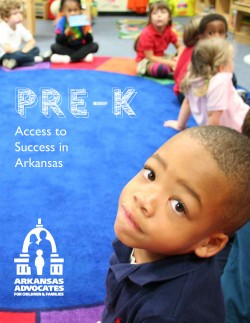
Research continues to confirm the importance of high-quality early childhood education as a strategy for improving the social, emotional, and intellectual development of children as well as increasing the likelihood of their future academic and economic success. A 2008 study by Jay Barth and Keith Nitta, for example, found that access to quality pre-k in Arkansas has done more than any other intervention to help close the education achievement gap between white and minority children and between middle-class and low-income students. (Download the Executive Summary for a comprehensive overview of the study.) Numerous national campaigns, such as the National Opportunity to Learn Campaign (OTL) led by the Schott Foundation and the Grade Level Reading Campaign (GLR) led by the Annie E. Casey Foundation have made access to quality early childhood education a focal point of their campaigns to improve educational outcomes for all children.
Arkansas has made access to quality early childhood education a major priority over the past two decades. It created the original Arkansas Better Chance Program (our state funded pre-k program) in 1991 with a state appropriation of $10 million. In 1997, Arkansas established the Division of Child Care and Early Childhood Education (DCCECE) in recognition of the critical role that these programs played in the lives of working families and their children. After more than a decade, the demand for these programs remains constant as economic realities require more parents to work and the child poverty rate increases. The cost of child care competes with rent, food, and utilities for the limited resources available to Arkansas’ many low-wage workers.
In 2003 the Arkansas General Assembly passed landmark legislation creating the Arkansas Better Chance for School Success (ABCSS) program for three and four-year-old children who live in families with incomes less than 200% of the federal poverty line (i.e., $46,100 for a family of four in 2012). The ABCSS program built on an earlier Arkansas Better Chance (ABC) program that served a wider range of eligible children and continues to this day. However this 2003 legislation greatly expanded access to quality pre-school programs which required a lower student-to-teacher ratio, well qualified and compensated staff, proven curricula and learning processes, developmental screening and child assessment, meaningful parent and community engagement, and professional development. This report examines the current trends in access to both quality pre-K and regular child care programs available to vulnerable Arkansas families. For the purposes of this report, quality pre-K programs in Arkansas include the original ABC, ABCSS, and Head Start programs.
